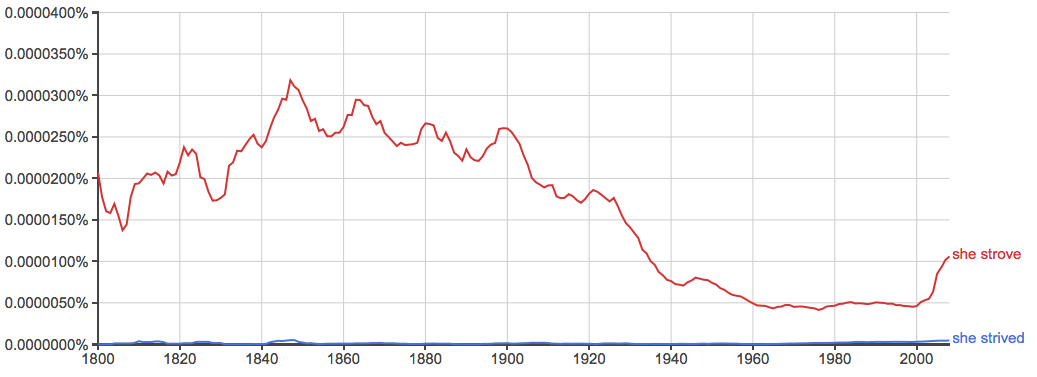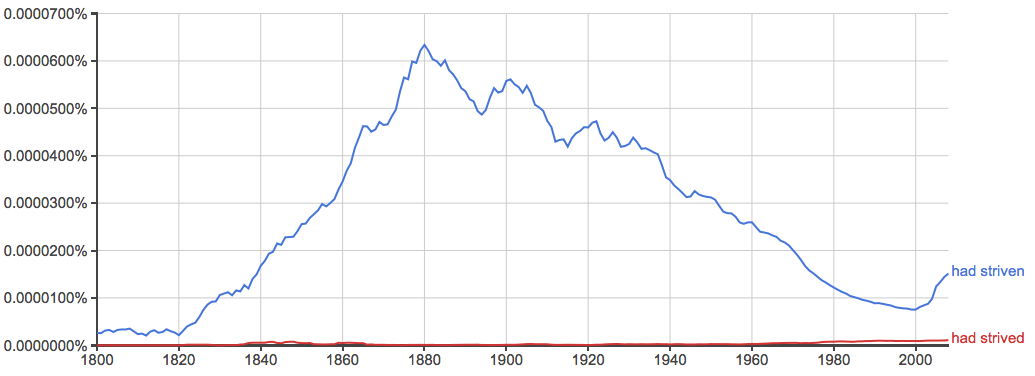Regular verbs are easy enough to remember in English, although they do cause occasional confusion. Irregular verbs, however, make life difficult even for the most seasoned writers.
Strive is an irregular verb, which means it doesn’t follow the set English conjunction rules. Luckily, it keeps company with several other irregular verbs that follow its same conjugation rules.
This family of verbs provides an easy way for writers to remember the correct way to conjugate strive. If you have ever wondered how to conjugate this irregular verb in the past tense, this article is for you.
What is the Past Tense of Strive?
In this post, I will compare strived vs. strove. I will include example sentences for each word, so you can see them in context.
Following that, I will show you a mnemonic device that will make choosing strove or strived much easier.
When to Use Strove
 What does strove mean? Strove is a verb, namely, the simple past tense conjugation of the verb strive. To strive is to work hard for something.
What does strove mean? Strove is a verb, namely, the simple past tense conjugation of the verb strive. To strive is to work hard for something.
An athlete might strive for a new personal record in a race, or a student might strive for an A on a test. Someone who strove for something worked hard to accomplish it in the past.
For example,
- We strove for perfection, and though we did not achieve it, we accomplished something great.
- Jackson strove for a world title, but he was defeated in under a minute by Attinborough.
- For generations, the New York Times strove for singular meaning and significance. The message to everyone who has ever worked there was that they were made by the Times and lesser without it. –The New York Times
Strove is one way to conjugate strive, but the verb has many tenses.
Conjugations of Strive:
- I/we strive: singular/plural first person present
- You strive: singular/plural second person present
- He/she/it strives: singular third person present
- They strive: plural third person present
- Strove: simple past
- Striven: past participle
- Striving: present participle
When to Use Strived
 What does strived mean? Strived is an erroneous past tense conjugation of strive. Most usage authorities recommend strove in the simple past and striven as a past participle, leaving no room for strived anywhere.
What does strived mean? Strived is an erroneous past tense conjugation of strive. Most usage authorities recommend strove in the simple past and striven as a past participle, leaving no room for strived anywhere.
Indeed, the following charts, which graph strove vs. strived over time, indicate that strived is not common in either of these tenses.
Simple past tense of strive:

Past participle of strive:

In edited, published works in English, since at lease the year 1800, strove and striven are the vastly predominant form, appearing anywhere from 5 to 6 times more frequently than strived. It should be noted, however, that these graphs only look at books and excluded other mediums such as newspapers and magazines.
Also, interestingly enough, even the accepted versions of these words (strove and striven) peaked in the late 19th century, painting a portrait of a once-popular verb that has fallen into relative disuse.
Trick to Remember the Difference
Strived is not an accepted conjugation of strive, so you should always use strove in the simple past and striven as a past participle.
Remember that strive and strove are analogous to drive and drove. These rhyming verbs are a great way to remember the correct way to conjugate strive.
You could use the same trick with driven and striven when conjugating strive as a past participle.
Summary
Is it strived or strove? Strove is the simple past tense conjugation of the verb strive, which means to work hard to attain something. Strived is an unaccepted variant form that you should avoid. Use striven as a past participle.
To summarize,
- Use strove and striven.
- Avoid strived.
Contents
